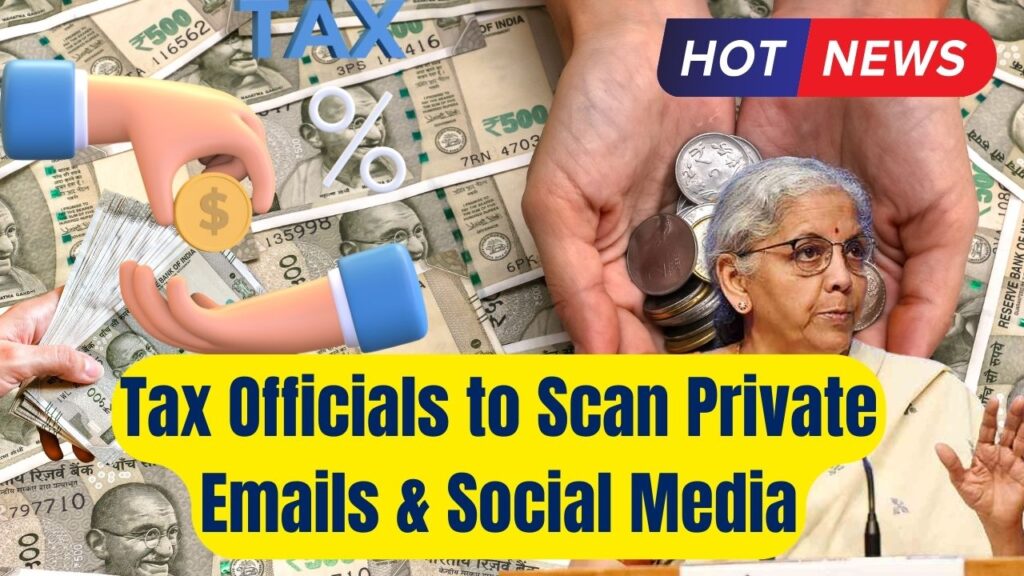
The new Income Tax Bill 2025 has sparked intense debate, especially regarding its provisions allowing tax officials to access private emails and social media accounts. This significant shift in taxation policy has raised concerns about privacy, security, and the extent of government oversight. While the bill aims to curb tax evasion and improve compliance, it has also drawn criticism for potential overreach.
In this article, we break down the bill, its implications, and what individuals and businesses need to know to stay compliant while safeguarding their privacy.
Income Tax Officials to Access Private Emails & Social Media
| Aspect | Details |
|---|---|
| Law Name | Income Tax Bill 2025 |
| Implementation Year | Expected April 2026 |
| Main Concern | Access to private digital platforms by tax officials |
| Purpose | Preventing tax evasion, ensuring financial transparency |
| Government’s Justification | Need for modern tax investigation tools |
| Privacy Concerns | Possible overreach, risk of misuse |
| What You Can Do | Maintain accurate tax records, use privacy tools |
| Official Reference | Income Tax Department |
The Income Tax Bill 2025 introduces sweeping changes to tax investigation procedures, granting officials access to private digital accounts. While this move aims to combat tax evasion, it has raised privacy and security concerns. Individuals and businesses must stay informed, maintain transparency, and take necessary precautions to protect their digital assets while remaining compliant with tax regulations.
What is the New Income Tax Bill 2025?
The Income Tax Bill 2025 is an updated version of India’s taxation laws, designed to address digital transactions, tax evasion, and financial irregularities. One of its most controversial provisions is that it grants tax authorities the power to access an individual’s email, social media, and cloud storage if suspected of financial fraud.
Why is this Change Happening?
The government argues that digital transactions and offshore tax havens have made it easier to hide income. Traditional tax investigation methods are no longer sufficient, so authorities need direct access to digital records to track unreported income, business transactions, and financial assets.
How Can Income Tax Officials Access Your Private Data?
Under the new law, tax officials can:
- Request Access to Digital Accounts – If they suspect tax fraud, they can ask for access to emails, social media, and online financial platforms.
- Override Security Measures – If access is denied, they may be permitted to override passwords and encryption tools.
- Monitor Digital Transactions – Any transactions flagged as suspicious can be investigated more deeply.
- Use AI and Big Data Analytics – Advanced algorithms will be used to detect tax evasion patterns in online activities.
Potential Impact of the New Law
1. Financial Institutions
Banks and financial institutions will have to comply with new regulations to share digital transaction records with tax authorities upon request. They may also be required to enhance digital monitoring of transactions.
2. Freelancers and Digital Entrepreneurs
Online businesses, freelancers, and social media influencers earning revenue through foreign clients, digital wallets, or cryptocurrencies will face stricter scrutiny. Any undeclared income from international transactions could trigger an investigation.
3. Investors & Stock Traders
If you are an investor or stock trader, ensure that all capital gains, dividends, and other investment income are accurately reported. Brokerage platforms may be required to share your trading records with tax authorities.
Legal and Privacy Concerns
While the government justifies these measures as necessary for preventing tax evasion, privacy advocates warn of overreach. Legal experts argue that judicial oversight is necessary to prevent misuse of power.
- Right to Privacy: The Supreme Court’s landmark ruling in Justice K.S. Puttaswamy v. Union of India (2017) established privacy as a fundamental right.
- Lack of Judicial Approval: Critics argue that tax authorities should require a court order before accessing private data.
- Potential for Misuse: Concerns exist that officials may use these powers against political opponents or critics.
How to Protect Your Digital Privacy
While complying with tax laws is non-negotiable, you can take steps to protect sensitive financial and personal data:
1. Enable Two-Factor Authentication (2FA)
Using 2FA on email and social media accounts can prevent unauthorized access, even if passwords are compromised.
2. Encrypt Financial Communications
Use encrypted email services and secure messaging apps for sensitive financial discussions.
3. Monitor Social Media Sharing
Avoid posting financial transactions or investments publicly, as these can be scrutinized by tax authorities.
4. Maintain Clear Tax Records
Keep detailed records of income, expenses, and tax payments to avoid suspicion of tax evasion.
5. Consult a Tax Professional
If you are unsure about the new regulations, consult a tax expert or financial advisor to ensure compliance.
Good News for Beneficiaries! Lakshmir Bhandar Scheme Payments Increased
Frequently Asked Questions (FAQs)
1. Can the government read my emails and social media messages?
Yes, under the new bill, tax officials can request access to digital communications if they suspect tax evasion. However, this should ideally be subject to legal oversight.
2. What if I refuse to give access to my digital accounts?
Authorities may have the power to override security measures, so refusing access may not prevent an investigation. It is best to comply with tax laws and seek legal advice if concerned.
3. How can I protect my data while remaining compliant?
- Use strong passwords and encryption.
- File taxes transparently and accurately.
- Limit public financial disclosures on social media.
- Seek legal or tax advice if you have concerns.
4. Will businesses also be affected?
Yes. Businesses will need to maintain accurate financial records and ensure compliance to avoid legal scrutiny under the new law.
5. When will the bill be implemented?
The bill is expected to take effect in April 2026, but discussions are ongoing regarding its final provisions and legal safeguards.







